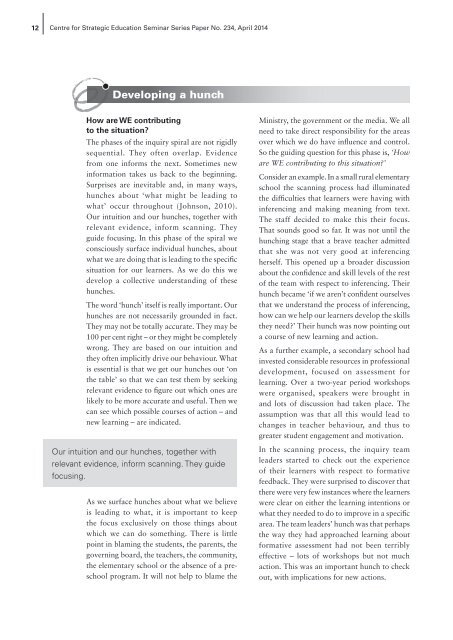Spiral of Inquiry
Spiral of Inquiry
Spiral of Inquiry
- No tags were found...
You also want an ePaper? Increase the reach of your titles
YUMPU automatically turns print PDFs into web optimized ePapers that Google loves.
12 Centre for Strategic Education Seminar Series Paper No. 234, April 2014Developing a hunchHow are WE contributingto the situation?The phases <strong>of</strong> the inquiry spiral are not rigidlysequential. They <strong>of</strong>ten overlap. Evidencefrom one informs the next. Sometimes newinformation takes us back to the beginning.Surprises are inevitable and, in many ways,hunches about ‘what might be leading towhat’ occur throughout (Johnson, 2010).Our intuition and our hunches, together withrelevant evidence, inform scanning. Theyguide focusing. In this phase <strong>of</strong> the spiral weconsciously surface individual hunches, aboutwhat we are doing that is leading to the specificsituation for our learners. As we do this wedevelop a collective understanding <strong>of</strong> thesehunches.The word ‘hunch’ itself is really important. Ourhunches are not necessarily grounded in fact.They may not be totally accurate. They may be100 per cent right – or they might be completelywrong. They are based on our intuition andthey <strong>of</strong>ten implicitly drive our behaviour. Whatis essential is that we get our hunches out ‘onthe table’ so that we can test them by seekingrelevant evidence to figure out which ones arelikely to be more accurate and useful. Then wecan see which possible courses <strong>of</strong> action – andnew learning – are indicated.Our intuition and our hunches, together withrelevant evidence, inform scanning. They guidefocusing.As we surface hunches about what we believeis leading to what, it is important to keepthe focus exclusively on those things aboutwhich we can do something. There is littlepoint in blaming the students, the parents, thegoverning board, the teachers, the community,the elementary school or the absence <strong>of</strong> a preschoolprogram. It will not help to blame theMinistry, the government or the media. We allneed to take direct responsibility for the areasover which we do have influence and control.So the guiding question for this phase is, ‘Howare WE contributing to this situation?’Consider an example. In a small rural elementaryschool the scanning process had illuminatedthe difficulties that learners were having withinferencing and making meaning from text.The staff decided to make this their focus.That sounds good so far. It was not until thehunching stage that a brave teacher admittedthat she was not very good at inferencingherself. This opened up a broader discussionabout the confidence and skill levels <strong>of</strong> the rest<strong>of</strong> the team with respect to inferencing. Theirhunch became ‘if we aren’t confident ourselvesthat we understand the process <strong>of</strong> inferencing,how can we help our learners develop the skillsthey need?’ Their hunch was now pointing outa course <strong>of</strong> new learning and action.As a further example, a secondary school hadinvested considerable resources in pr<strong>of</strong>essionaldevelopment, focused on assessment forlearning. Over a two-year period workshopswere organised, speakers were brought inand lots <strong>of</strong> discussion had taken place. Theassumption was that all this would lead tochanges in teacher behaviour, and thus togreater student engagement and motivation.In the scanning process, the inquiry teamleaders started to check out the experience<strong>of</strong> their learners with respect to formativefeedback. They were surprised to discover thatthere were very few instances where the learnerswere clear on either the learning intentions orwhat they needed to do to improve in a specificarea. The team leaders’ hunch was that perhapsthe way they had approached learning aboutformative assessment had not been terriblyeffective – lots <strong>of</strong> workshops but not muchaction. This was an important hunch to checkout, with implications for new actions.


